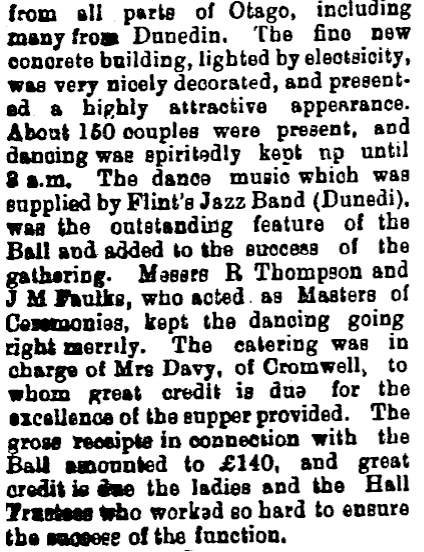Olympic Hall and the Wanaka Hall
Olympic Hall (c1887-c1922)
Wanaka Hall (1924-c2000)
Unless someone organized a barn dance, there was no place to hold a dance, have a wedding celebration or a town meeting in the early days, apart from perhaps the Wānaka Hotel. In the 1870’s and following years the population would have been very small, but as Wānaka grew, there became a need for a place to meet.
On 25 May 1876, Theodore Russell, the owner of the Wānaka Hotel, was granted a Crown Grant over the block of land on the corner of Ardmore Street and what we now know as Lakeside Road.[14] This is roughly the land on which the current Ardmore House building is erected on. Unfortunately, Theodore died on 14 November 1877 aged just 33, but his wife Celia, who inherited his assets, was a strong supporter of community activities, something she continued to organise until she died in 1905.
[14] Register Book , Volume 40, Folio 72
The hall is the larger building and probably the hotel washing is on the line.
The building on the left was the blacksmiths.
On 21 November 1920, John Faulks purchased the land and the hall. Over the following 18 months it appears that a few locals got together with John, and on 11 July 1922 he transferred ownership to Willis Scaife, James Perrow, Francis Thomson and Fred Collings as trustees. The old Olympic Hall was removed to Haugh’s farm in the Maungawera Valley, to be used as a farm building, and plans were afoot to build a new hall.
A tender for the construction of the new hall for £2368 was accepted and the new hall opened on 12 May 1924. A Ball was held to celebrate the occasion as reported in the Lake County Press, 29 May 1924, Page 3:
Until 1939, it appears that electricity for power and lighting was made available from the Wānaka Hotel’s generating plant across the road. The secretary was instructed to negotiate with the power board for an independent supply.
In 1958 when the Wānaka Hotel (No. 2) burnt down, a licence was granted to open a bar operated by the owner, Mr Muir.
The Wānaka Hall had more than its fair share of events that affected the future of the Upper Clutha, e.g. the turning-on of electricity for the town (1939/40) and even the first picture theatre. In 1955 it was decided that movies should take precedence over other events. But by March 1964, the numbers of trustees had ‘thinned out’. A citizen’s committee took over and the Wānaka Hall Committee became an incorporated society. They set a number of new rules including:
The objects of the Society were to hold the land on which the hall stood, and acquire further land for the use and benefit of residents and visitors; to control and maintain a public hall and do what was considered necessary to promote social activities in the town.
Anyone 21 or over, of good character and residing in the county town of Wānaka, and within 10 miles from the hall was eligible for membership. Applications were formal. They had to be in writing and a candidate needed support of two-thirds of the voting membership for election.
The annual subscription, payable on April 1, was to be fixed at annual meetings. It started off at 1/- (one shilling) and does not seem to have been increased at any stage.
In 1973 it was decided to commence negotiations for management of the hall be taken over by the Lakes County Council. This took a while, and it was not until 1983 that the Wanaka Hall Committee disbanded.
After the Council took control there were proposals to build a new community hall on Pembroke Park. This was vociferously opposed by most of the residents. In 2001 the Lake Wānaka Centre was opened on the site of the old Wānaka Hotels.





